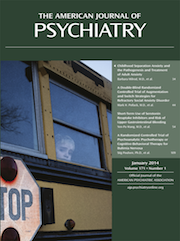In his early 20s, the legendary Beat poet Allen Ginsberg (
1) was hospitalized at the New York State Psychiatric Institute, where nearly 40 years later I would first learn psychiatry. Ginsberg’s hospitalization came after he read William Blake, had mystical visions, fell in with junkies, and got arrested after riding in a stolen car with stolen goods.
What had happened? And how did he turn his encounters with madness into great art through writing? These questions could only be answered by talking with the poet himself. So I typed a 1-page letter asking him how he reconciled different views of madness in his art and life.
Within a few days, Allen Ginsberg left a message on my answering machine. When I called him back the next morning, he asked if I was writing a book. He had anticipated my ambitions even before they were clear to me. In shock, I managed to utter, “Uh, yes?” He replied, “Then meet me tomorrow evening at the Museum of Modern Art.”
He arrived in a blue blazer, crisp white shirt, and conservative tie. We shook hands. It was after hours, but the guards let us in and we made our way to a table in the cafeteria near the wall of windows overlooking the sculpture garden. Sitting with an icon put my nerves on edge, but sensing my unease, he asked me to call him Allen and began speaking gently, as might an uncle. We talked for 40 minutes as workers set up for a reading of Indian poets.
I started to pepper him with questions: “Did you really need to be hospitalized? Did it help? What did the psychiatrists think was your problem?”
I was a Columbia student with no job, nowhere to go, suffering from vocational disability. It was either go to jail or shuffle off bourgeoisie-style to a bughouse.
I was at the Psychiatric Institute for eight months. Don’t know why it was so long. I had a good time. Read a lot. Wrote a lot. I went through psychotherapy for the first time, which I enjoyed. No drugs. No E.C.T. They were doing transorbital lobotomies at the time. Saw lots of them. But none of that stuff for me.
By and large they were helpful to me. Although I have some issues with psychiatry uptown at Columbia. I just think that their practice should be more open.
If you want to check the medical records, go ahead. My secretary will give permission.
Ginsberg let me interview him multiple times, diligently answering all my questions with engaging stories and analyses. He also granted me access to his personal archives and his mother’s psychiatric records. Naomi Ginsberg had a severe chronic psychotic illness and was in and out of state mental hospitals for most of her adult life, receiving electroconvulsive therapy, insulin therapy, and lobotomy.
But when I pressed him to speak about the visions, he insisted that I first read (
2). He didn’t want an eager young psychiatrist to subject his visions to reductionist psychiatric formulations and dismiss them as hallucination, like his psychiatrist at the time had done. The story he eventually told me was a moving testimony to the aesthetic and spiritual dimensions of the visions.
Ginsberg was incredibly open and generous, encouraging me to tell the complete story of his experiences with madness and psychiatry, even when what I learned was deeply personal and painful and contradicted the prevailing public knowledge about him.
He also started asking more and more about what I was learning about psychiatry at Columbia and then later at Yale. One day after an early dinner in the East Village, he looked at me and announced, “I want to make you into my kind of psychiatrist.”
The things Allen taught me about psychiatry were not as radical as his poetry, the choices he made in his life, or the books he had me read (
3–
7). But they were powerful and transformative ways of seeing outsiders, struggle, suffering, spirituality, art, drugs, and love that were clearly different from what I was hearing from my teachers and reading in journals.
Ginsberg looked for new language and ideas in works of artistic genius but also in the everyday genius of people going through hardships. His whole being was a living testimony that going through too much could make somebody vivid, engaged, compassionate, and compelling instead of just wounded and scarred.
To Ginsberg, madness was not just illness, ecstasy, derangement, or any other one thing. Rather, there could be multiple meanings of madness, and letting those meanings flourish through poetry could powerfully challenge existing orders.

